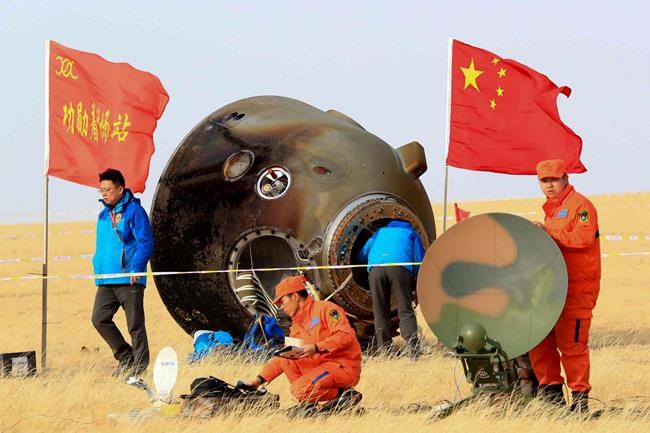Elevate your local knowledge
Sign up for the iNFOnews newsletter today!

BEIJING – Two Chinese astronauts returned Friday from a monthlong stay aboard the country’s space station, China’s sixth and longest crewed mission and a sign of the growing ambitions of its rapidly advancing space program.
Veteran mission commander Jing Haipeng and first-time space traveller Chen Dong were reported in good health after their Shenzhou 11 return vehicle landed on the frozen steppes of Inner Mongolia.
They spent 30 days aboard the Tiangong 2 station conducting experiments and testing equipment in preparation for the launching of the station’s core module in 2018. A fully functioning, permanently crewed space station is on course to begin operations six years from now and is slated to run for at least a decade.
The success of the mission “indicates that our manned space program has achieved major new progress and is the latest achievement in building a country of innovation and a world power of science and technology,” the ruling Communist Party’s Central Committee, the Cabinet and the party commission controlling the military said in a congratulatory message.
“It is the newest achievement of Chinese people in climbing the peak of the world,” said the letter, read out by Vice Premier Zhao Gaoli at the space flight control centre in Beijing.
Since first launching a human into space 13 years ago, China has launched two space stations, staged a spacewalk, landed a rover on the moon and is now considering sending a crewed lunar mission.
The Tiangong, or “Heavenly Palace,” space stations are considered stepping stones to a mission to send a rover to Mars by the end of the decade. Communications with the disused experimental Tiangong 1 station have been cut and it is expected to burn up on entering the atmosphere next year.
China was excluded from the International Space Station mainly due to U.S. legislation barring such co-operation and concerns over the Chinese space program’s strongly military character.
Chinese officials are now looking to internationalize their own program by offering to help finance other countries’ missions to Tiangong 2, which, at 60 tons when completed, would still be considerably smaller than the 420-ton ISS. The space station was launched on Sept. 15 and is orbiting 393 kilometres (244 miles) above Earth.
In a recent editorial, state newspaper China Daily congratulated the country on having “never given up on its resolve to catch up with the world’s leaders in science and technology, as its leadership understands the importance of science and technology for a nation’s development.”
“That explains why China has achieved such a lot in the development of its space technology in the past two decades and is striving to make new breakthroughs,” the paper said.
Want to share your thoughts, add context, or connect with others in your community?
You must be logged in to post a comment.